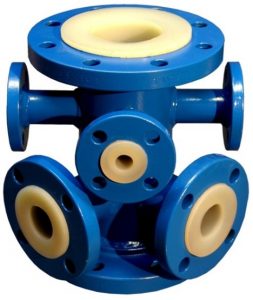PTFE lined fittings and PTFE lined pipes
PTFE lined pipes and lined fittings
Some substances are capable of damaging steel piping and stainless steel piping through corrosion. Corrosion is the chemical deterioration of materials as their environment acts on them. This process converts pure metal into a more chemically stable metal oxide. In acid corrosion, metals react with an acid leading to weakening and damage to the metal surface. Over time, this can lead to such weakening of pipe parts that leaks occur. To prevent this, Hanwel B.V. supplies pipe components and fittings that are equipped with a protective internal liner to prevent acid corrosion. We supply complete PTFE lined piping components and PFA lined piping components to protect systems.


Transporting and storing corrosive substances
For the transport of corrosive materials, we supply complete piping systems with a PTFE or PFA liner. The PTFE or PFA liner with a standard thickness of 3mm to 9mm protects the steelwork against acid corrosion. Our systems are flanged according to DIN EN 1092-1 or ASME B16.5.
For these critical components, the selection of materials is crucial to the performance of the system. Unfortunately, however, the quality of liners varies significantly between manufacturers. To ensure the quality of our liner, we only use paste extruded virgin white PTFE according to ASTM D4895 and virgin PFA according to ASTM D3307. The steelwork is of European origin at all times. Depending on the exact medium and degree of permeation, we can adjust the thickness of our liner to provide optimal protection.
Controlling corrosive substances
Valves that deal with corrosive substances should also be provided with a protective liner to prevent damage. Hanwel B.V. supplies various PTFE lined valves and PFA lined valves such as ball valves, butterfly valves, swing check valves, poppet check valves, plug valves and sample valves.
Depending on the valves in question, we use a PFA liner or a PTFE liner with a minimum thickness of 3.0mm. We supply PTFE lined valves with flanges according to DIN EN 1092-1 (PN10/PN16/PN40) or ASME B16.5 (150 lbs., 300 lbs.). House materials are possible in cast iron, carbon steel, stainless steel and high quality alloys like Duplex or Hastelloy C22.


Accessories for the storage and transport of corrosive substances
During storage, transport and control of corrosive substances, several components are required that help make and keep the process as safe as possible.
PFA lined sight glasses provide a visual picture of the reaction taking place in the system and help maintain control. Shields and safety covers protect operators from leaks that can occur at flange connections or fittings. Ventilation systems assist by draining any leakage to a safe drain point as quickly as possible. PTFE insert pipes and PTFE inserts help prevent corrosion of critical elements such as nozzles of tanks or reactors. PTFE lined filters help keep the system as clean as possible. Flange gaskets help prevent leaks at flange connections.
Contact our specialists for a customized solution.
Removing stress during the transport of corrosive materials
In addition to PTFE lined piping and PFA lined fittings, we also supply PTFE expansion joints. Expansion joints are flexible fittings in piping to absorb movements or vibrations. Think of absorbing vibrations at a pump or absorbing thermal expansion. This is why they are often called expansion joints. Welflex PTFE expansion joints are very flexible so that a relatively large movement on a short installation length can be compensated.
PTFE expansion joints have excellent chemical resistance. The pressure resistance of PTFE expansion joints decreases significantly at high temperatures. Hanwel supplies a wide range of expansion joints so that we can offer a solution for almost every application. Please contact our specialists for customized advice.









